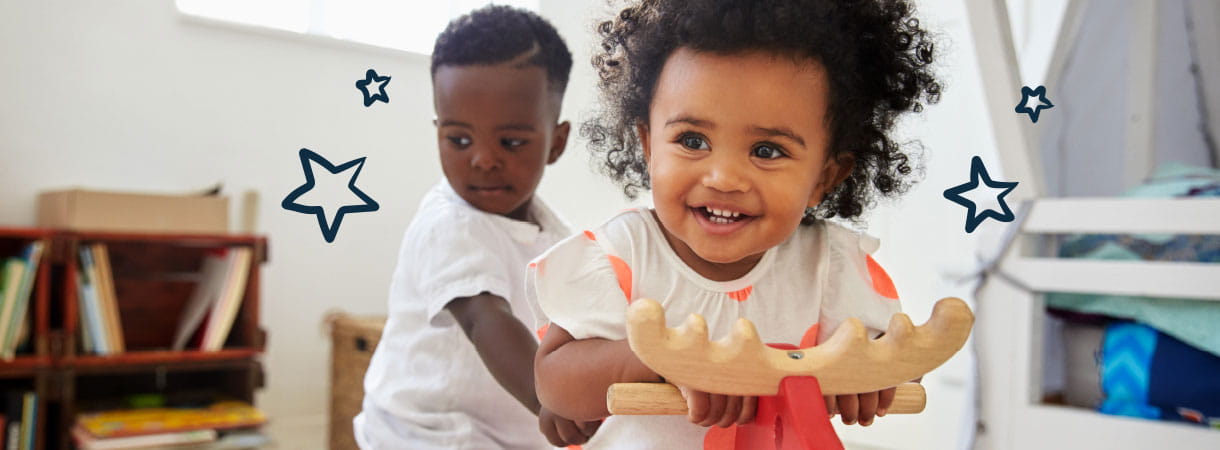Welcome to the At-Home Learning Hub!
Discover interactive activities for all ages and stages!
Let’s keep the learning (and play!) going at home. Here you’ll find a selection of helpful activities for all ages adapted from our proprietary curriculum to help your family stay active and engaged at home.
To help you choose which activities are best for your family (or schedule) we’ve noted the time, materials, and engagement level you’ll need. We’ve also provided tips for their nutrition and dealing with big feelings, plus ideas for establishing new routines and creating safe, nurturing spaces.
To help you choose which activities are best for your family (or schedule) we’ve noted the time, materials, and engagement level you’ll need. We’ve also provided tips for their nutrition and dealing with big feelings, plus ideas for establishing new routines and creating safe, nurturing spaces.
At-Home Learning Activities
Babies: Ages 0-1
Infants learn through caring, responsive interactions. Routine activities like changing or feeding time do more than meet their physical needs; they’re also opportunities to help them learn and grow.
These guides are filled with simple and fun activities adapted from our curriculum that help you support your baby’s learning from home. Many are even easy enough to do while you’re working to help keep your little one entertained.
Toddlers: Ages 1-2
Toddlers learn through their limitless curiosity and a natural desire to push boundaries and explore their world. Increased mobility means they need access to a variety of experiences that are safe and engaging.
Discovery Preschoolers: Age 2
Two-year-olds are incredible learners, discovering more about themselves and the world around them every day. They begin leading their own activities to develop social skills like cooperation, sharing, and taking turns. They’ll also start making important choices and discoveries in their world.
Adapted from our curriculum, activities in this guide bring classroom learning home. They may need your support the first or second time, but many can be explored independently after some practice to help free up time for your work or daily responsibilities.
Find more at-home activities for your 2-year-old on our blog!
Preschoolers: Age 3
Preschoolers’ worlds open in exciting new ways as they improve coordination, learn complex games, and begin to interact more with adults and their peers. A large part of a three-year-old’s learning happens through child-directed play where they continue to make important choices and discoveries about their world.
Adapted from our curriculum, activities in this guide bring classroom learning home. They may need your support the first or second time, but many can be explored independently after some practice to help free up time for your work or daily responsibilities.
Prekindergarteners: Age 4
Prekindergarteners’ learning promotes independence to prepare them for the next exciting phase in their education and development: kindergarten! Four-year-olds can describe familiar people, places, things, and events with detail, using information and thoughts from past experiences.
Adapted from our curriculum, activities in this guide bring classroom learning home. Many can be explored independently after a quick setup and some practice with an adult, freeing up time for your work or daily responsibilities.
Find more at-home activities for your prekindergartner on our blog!
School-Agers: Ages 5+
For school-agers, it’s all about learning to work independently and balancing school and life. Our guides have activities that provide a perfect break from their school’s distance learning routine while still encouraging general learning in an open-ended manner.
Activities can be adjusted for children of all abilities. They may love screens at this age, but it makes a big difference when they use technology for creative purposes rather than just consuming games and video. We also include movement and mindfulness activities that can be done any time of day!
Find more at-home activities for your school-ager on our blog!

Nutrition & Wellness
Social-emotional learning (SEL) is the process children go through in learning how to navigate their emotions, relationships, and interactions. These skills help them learn how to appropriately manage their big emotions and support long-term mental health, becoming their compass for building strong relationships with themselves and others.
We've put together some resources for you to support your child’s social-emotional learning at home.

Nutrition & Wellness
Picky eaters can make grocery trips tough for getting kids a variety of vegetables, fruits, grains, and proteins—let alone ones they enjoy. So, we’ve compiled some guidance for keeping their diets consistent, plus some time-saving tips for simpler, wholesome mealtimes.

More Resources
Reading together is a powerful learning activity for kids. Good thing we’ve got recommendations for books galore!
Less screen time is a good thing, but sometimes screens can be a great outlet for learning! Our screen-time tips for digital learners can help.
Less screen time is a good thing, but sometimes screens can be a great outlet for learning! Our screen-time tips for digital learners can help.
![]()

